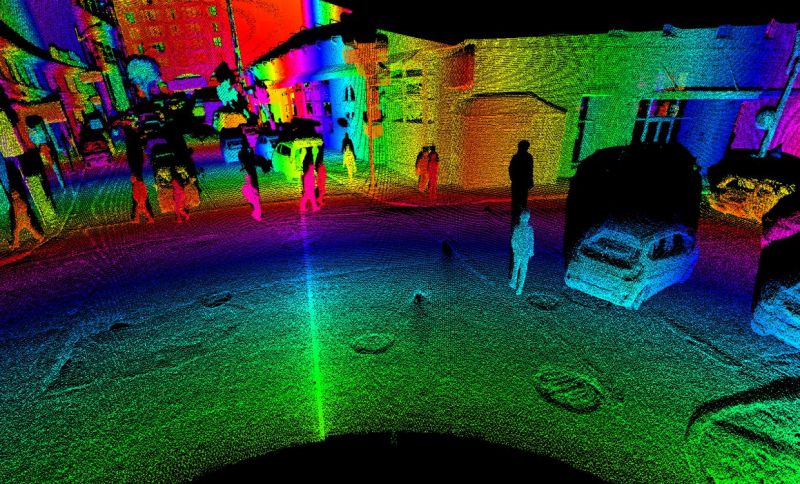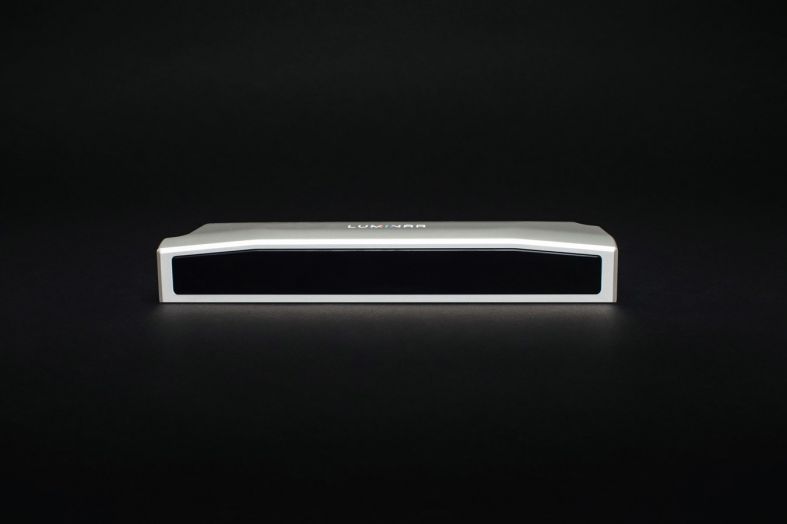Autonomous Driving Startup Pony.ai Will Use Lidar Sensors From Luminar for its Next-Gen Robotaxi Vehicles
【Summary】Autonomous driving startup Pony.ai announced its newly designed perception platform in collaboration with Volvo-backed Luminar Technologies. The next-generation fleet of self-driving Pony.ai robotaxi vehicles will integrate Luminar’s new Iris lidar sensor. The company plans to deploy its robotaxi vehicles equipped with Luminar lidar by 2023.

Autonomous driving developer Pony.ai announced its newly designed perception platform in collaboration with Volvo-backed Luminar Technologies, Inc. The next-generation fleet of self-driving Pony.ai vehicles will integrate Luminar's Iris sensor.
Pony.ai is working on an autonomous robotaxi service and the company selected Luminar's lidar to support its new autonomous fleet. Pony.ai plans to deploy the automotive-grade lidar its its robotaxi vehicles by 2023 globally.
Automakers and tech startups are partnering with lidar startups like Luminar and rival Velodyne that can produce automotive-grade lidar sensors at scale for vehicles that will come equipped with autonomous driving capability.
"Partnering with Luminar is a critical enabling milestone for Pony.ai as we build our next-generation system and prepare for large-scale series production," said James Peng, CEO and Founder of Pony.ai. "Luminar is in a league of their own when it comes to lidar and shares our belief that delivering autonomous mobility globally will enable a safe and sustainable future. We're excited to realize that vision together with them."
The demand for high performance lidar is growing as automakers introduce advanced driver assist systems (ADAS) that support Level 2 and higher automated driving. Much of this demand is for lidar sensors capable of detecting objects at a longer range, so autonomous vehicle software can more quickly respond to any hazards, such as a pedestrian in the street. Luminar's Iris lidar sensor can detect a vehicle 250 meters away.
Luminar was founded in 2012 and is a publicly traded company. Luminar launched its U.S. IPO in Dec 2020 in a reverse merger with SPAC company Gores Metropoulos, Inc. Luminar was the second lidar company to launch an IPO in 2020, following the Wall Street debut of Silicon Valley- based rival Velodyne on Sept 30, 2020.
In May 2020, Luminar signed the auto industry's first lidar production deal for consumer vehicles with Volvo Cars, which will also come with Luminar's lidar to support automated driving features.
In addition to Volvo, Luminar formed partnerships with Chinese automaker SAIC Motor, Daimler Truck AG and Intel's computer vision company Mobileye to supply its technology.

Luminar's Iris lidar sensor is slim enough to be mounted on the roof of a production vehicle.
Lidar is a laser technology that emits pulses of laser light which are reflected back off objects, such as buildings and cars. The light that's reflected back is used to create a 3D image of the environment known as a lidar point cloud.
The technology is an essential sensor for most developers of self-driving vehicles, acting as an extra set of eyes on the road. Using multiple lidar sensors provides complete 360-degree perception coverage for safe navigation.
Luminar's Iris lidar sensor is also backed by robust software which is used to identify objects, such as other vehicles or pedestrians. The software supporting the Iris lidar can also be upgraded over the air as new features are rolled out.
Lidar can also be used to measure an object's velocity and direction by measuring time-of-flight (ToF), which is how low it takes for the light to reflect back after being emitted from the sensor.
Pony.ai was founded in Fremont, California with the goal of building safe and reliable autonomous driving technology that can be added to a production vehicle.
In February, the company announced it closed on $367 million in new Series C funding as its works to develop an autonomous ride-hailing service. The latest funding round makes Pony.ai one of the most valuable self-driving startups with a valuation of roughly $5.3 billion.
A year ago, Pony.ai announced a $400 million investment from Japan's Toyota Motor Corp. to expand its collaboration with the automaker on self-driving cars.
The lidar partnership with Luminar partnership follows Pony.ai's expansion of its robotaxi service across five cities in China and the U.S., including Guangzhou, Shanghai, Beijing, Irvine and Fremont, CA. Pony.ai says it's the only self-driving company with large-scale deployment across five cities internationally and a fleet of over 200 autonomous vehicles.
To date, Pony.ai has driven more than five million kilometers across a coverage area of over 850 square kilometers in China. The company has provided more than 220,000 Robotaxi rides so far.
Pony.ai began testing China's first Robotaxi service called "PonyPilot'' in late 2018 in Guangzhou. It was also the first company to roll out a public-facing Robotaxi service called "BotRide" in Irvine, California in a partnership with automaker Hyundai in Oct 2019.
For the pilot in California, Hyundai tapped Pony.ai to build the self-driving system for the fleet of vehicles and transportation startup Via created the BotRide on-demand ridesharing technology and customer app.
"Pony.ai's vision to create a dynamic, vehicle-agnostic autonomous driving system is very impressive, and it has already demonstrated a clear leadership position for Robotaxi development in China and beyond," said Austin Russell, Founder and CEO of Luminar. "This partnership marks a significant milestone towards the realization of safe autonomous robotaxi services in the years to come."
In an interview with CNBC in Nov 2019, Pony.ai Chief Executive James Peng predicted that fully autonomous vehicles that carry passengers in China will be a reality by 2024.
"If I have to give a number, I'll probably say in five years," said Peng. "We'll definitely see a wide adoption of autonomous driving vehicles—fully autonomous driving vehicles—on the open roads."
If Peng's prediction is true, demand for automotive-grade lidar will only increase and Luminar is prepared to become a major supplier to the industry.
-


Ford is Testing a New Robotic Charging Station to Assist Drivers of EVs With Disabilities
-


Ford Raises the Prices of the F-150 Lightning Electric Pickup Due to Rising Raw Material Costs
-


The BMW 7-Series to Feature HD Live Maps From HERE Technologies for Hands-Free Highway Driving in North America at Speeds up to 80 MPH
-


AutoX to Use the 'Eyeonic Vision Sensor' from California-based SiLC Technologies for its Robotaxi Fleet in China
-


LG Develops ‘Invisible’ Speaker Sound Technology That Could Revolutionize In-Vehicle Audio
-


Researchers at South Korea’s Chung-Ang University Develop a ‘Meta-Reinforcement’ Machine Learning Algorithm for Traffic Lights to Improve Vehicle Throughput
-


Zeekr’s New 009 Electric Passenger Van is the World’s First EV to Feature CATL’s Advanced ‘Qilin’ Battery With a Range of 510 Miles
-


Redwood Materials is Building an Electric Vehicle Battery Recycling Facility in South Carolina
- Toyota Offering Multiple Solutions for Non-Drivable bZ4X Electric SUVs
- EV Startup Fisker Inc. Hires BMW Exec as Senior VP of Manufacturing, Aims to Build One Million EVs a Year by 2027
- Lucid Launches New Performance Brand ‘Sapphire’ with a 1,200 Horsepower, Tri-Motor Version of the Lucid Air Sedan
- Tesla’s Battery Supplier Panasonic is Close to Selecting the Site of its New U.S. Battery Plant
- LiDAR developer Luminar Technologies Hires Ex Apple, Tesla and Nvidia Execs as it Prepares for Growth
- GM Expanding First Responder Training Program for EV Crashes
- High Gas Prices Aren’t Enough to Sway Consumers to EVs, Autolist Survey Finds
- Volvo Cars and Epic Games to Partner on a High-Resolution 3D Digital Driver’s Display Powered by the Unreal Engine
- SiLC Technologies Launches its Eyeonic Vision System, a LiDAR Sensor That Can Identify Objects up to 1 Kilometer Away
- Qualcomm Ventures Invests in ThunderX, a Company Developing a Domain Controller-based Intelligent Vehicle Compute Platform











 About Us
About Us Contact Us
Contact Us Careers
Careers